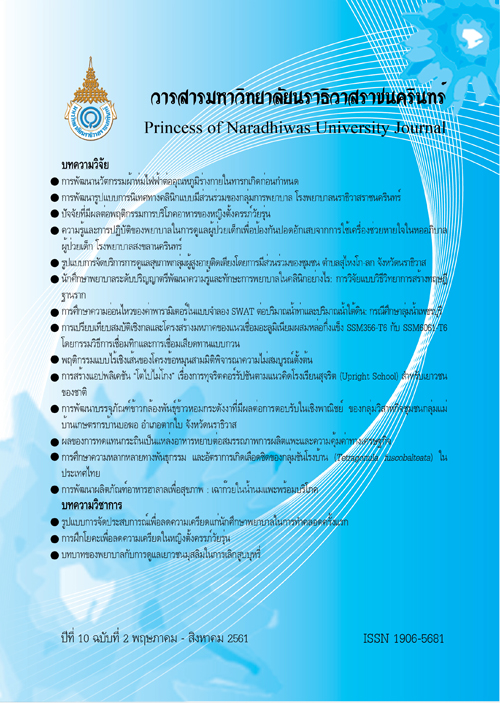การศึกษาความหลากหลายทางพันธุกรรม และอัตราการเกิดเลือดชิดของกลุ่มชันโรงบ้าน (Tetragonula fuscobalteata) ในประเทศไทย
คำสำคัญ:
ชันโรง, ความหลากหลายทางพันธุกรรม, อัตราการเกิดเลือดชิด, SSRบทคัดย่อ
ชันโรง จัดอยู่ในวงศ์ผึ้งแต่ไม่มีเหล็กใน สามารถช่วยผสมเกสรดอกไม้ในธรรมชาติได้เป็นอย่างดี จัดเป็นแมลงที่มีความสำาคัญต่อระบบนิเวศวิทยา ปัจจุบันสภาพแวดล้อมเปลี่ยนแปลงอย่างรวดเร็ว ซึ่งมีผลกระทบต่อประชากร และการดำารงชีวิตของชันโรงในประเทศไทยอย่างยิ่ง เห็นได้ชัดจากการจำากัดพื้นที่ในการสร้างรัง ตลอดจนแหล่งอาหารของชันโรงลดน้อยลง ซึ่งอาจทำาให้ชันโรงสูญพันธุ์ได้ในอนาคต ดังนั้นในการวิจัยเบื้องต้นครั้งนี้ต้องการศึกษาความหลากหลายทางพันธุกรรมของชันโรงในประเทศไทย และอัตราการเกิดเลือดชิดของชันโรง โดยนำาตัวอย่างชันโรงจากเขตภาคใต้ และภาคตะวันออก ทั้งหมด 9 รัง
มาแยกความแตกต่างในระดับโมเลกุล หรือ DNA ด้วยเทคนิค SSR (Simple Sequence Repeat) จำานวน 3 ตำาแหน่ง ซึ่งพบ
ว่าชันโรงที่อยู่บริเวณใกล้เคียงกันจะมีความสัมพันธ์ใกล้เคียงกันมาก มีอัตราการเกิดเลือดชิดสูง เช่น ชันโรงจากจังหวัดชุมพร
รังที่ 3 (CP3) กับชุมพร รังที่ 4 (CP4) พบว่ามีอัตราเลือดชิดสูงถึง 91.79% ส่วนชันโรงที่อยู่จังหวัดใกล้เคียงกัน เช่น จังหวัด
ชุมพร (CP1 และ CP2) กับจังหวัดประจวบคีรีขันธ์ มีอัตราเลือดชิด 45.59%
เอกสารอ้างอิง
Cameron, E.C., Franck, P. & Oldroyd, B.P. (2004). Genetic Structure of Nest Aggregations and Drone Congregations of the Southeast Asian Stingless Bee Trigona collina. Molecular Ecology, 13, 2357-2364.
Green, L.C., Franck, P. & Oldroyd, B.P. (2001). Characterization of Microsatellite Loci for Trigona carbonaria, a Stingless Bee Endemic to Australia. Molecular Ecology Notes. DOI: 10.1046/ j.1471-8278.2001.00041.x.
Kalinowski, S.T., Taper, M.L. & Marshall, T.C. (2007). Revising how the computer program CERVUS accommodates genotyping error increases success in paternity assignment. Molecular Ecology, 16, 1099-1106.
Moure, J.S. (1961). A Preliminary Supra Specific Classification of the Old World Meliponine Bees (Hymenoptera
Apidae). Studia Entomologica, 4, 181-242.
Olivier, J., Hardy, J. & Vekemans, X. (2002). Spagedi: a versatile computer program to analyse spatial genetic structure at the individual or population levels. Molecular Ecology Notes, 2, 618-620.
Paxton, J.R., Thoren, P.A., Tengo, J., Estoup, A. & Pamilo, P. (1996). Mating Structure and Nestmate Relatedness in a Communal Bee, Andrena Jacobi (Hymenoptera, Andrenidae), Using Microsatellites. Molecular Ecology, 5, 511-519.
Perrier, X., Flori, A. & Bonnot, F. (2003). Leadership and social exchange process. In Hamon, P., Seguin, M., Perrier, X. & Glaszmann, J.C. (Eds.). Data analysis Methods. pp. 43-76 Genetic Diversity of Cultivated Tropical Plants. Montpellier: Enfield, Science Publishers.
Rasmussen, C. & Cameron, A.S. (2007). A Molecular Phylogeny of the Old World Stingless Bees (Hymenoptera:
Apidae: Meliponini) and the Non-Monophyly of the Large Genus Trigona. Systematic Entomology, 32, 26-39.
Roubik, D.W. (1989). Ecology and Natural History of Tropical Bees. New York, USA: Cambridge University Press.
Ronfort, J., Bataillon, T., Santoni, S., Delalande, M., David, J.L. & Prosperi, J.M. (2006). Microsatellite diversity
and broad scale geographic structure in a model legume: building a set of nested core collection for studying naturally occurring variation in Medicago truncatula. BMC Plant Biology. DOI: 10.1186/1471-2229-6-28.
Schwarz, H.F. (1939). The Indo-Malayan Species of Trigona. Bulletin of The American Museum of Natural History Vol. LXXVI, Art. III, New York, U.S.A.
Tavares, M.G., Dias, L.A., Borges, A.A., Lopes, D.M., Busse, A.H.P. & Costa, R.G., et al. (2007). Genetic divergence between populations of the stingless bee urucu amarela (Melipona rufiventris group, Hymenoptera, Meliponini): Is threr anew Melipona species in the Brazilian state of Minas Gerais?. Genetics and Molecular Biology, 30(3), 667-675.
Theeraapisakkun, M. & Klinbunga, S. (2010). Development of a species-diagnostic marker and its application for population genetics studies of the stingless bee Trigona collina in Thailand. Genetics and Molecular Research, 9(2), 919-930.




